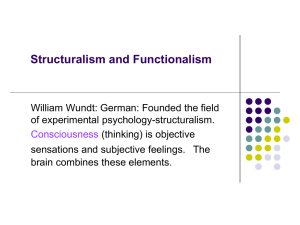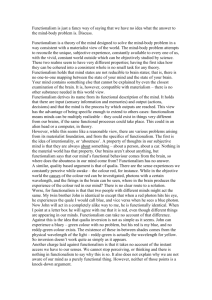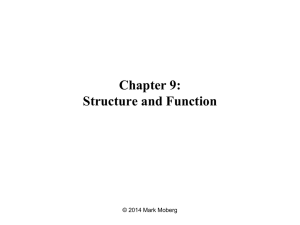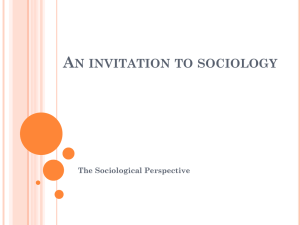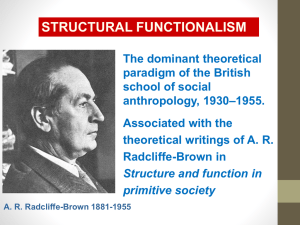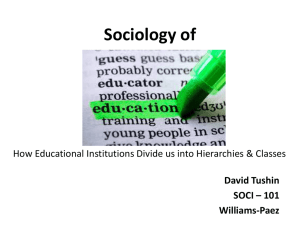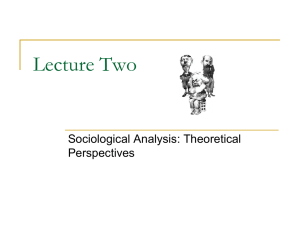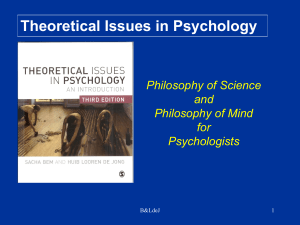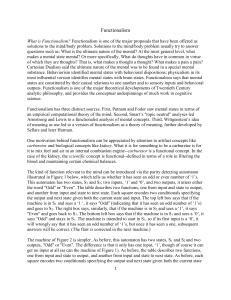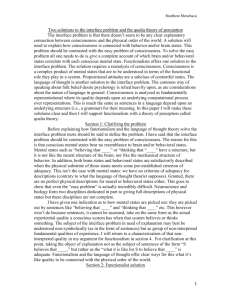Functionalism
advertisement
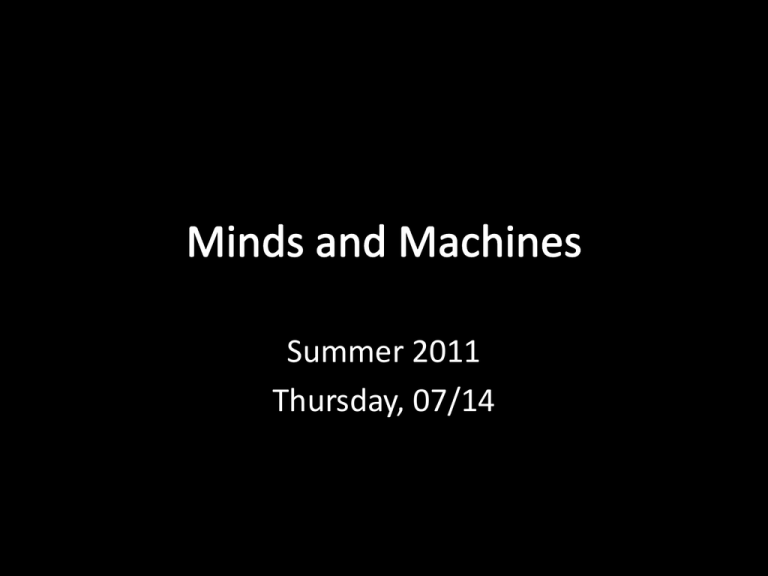
Summer 2011 Thursday, 07/14 Machine Functionalism • Claims that the mind is a (very complex) computer program. • One that arises naturally, not one that’s designed or programmed by anyone! • But what exactly does that mean? How can we understand this in a concrete, nonmetaphorical way? Machine Functionalism • This is where machine tables come in. • A machine table is a complete set of instructions for the machine’s operations, or a specification of the machine’s software. • You can think of it as a complex “job description” for a machine. The job description for a heart is to pump blood, but the job description for a coke machine is captured by the following table: Input Nickel Present State ZERO Go into this State FIVE Produce this Output − − Nickel FIVE TEN Nickel TEN ZERO Dime ZERO TEN Dime FIVE ZERO Coke Dime TEN FIVE Coke Coke − Machine Functionalism • The machine table for the coke machine captures what a coke machine essentially is. Any device that implements (or works according to) the machine table counts as a coke machine. • Similarly, the (far more complex) machine table for the mind captures what a mind essentially is. Any device (e.g. a human brain, a Martian brain, commander Data) that implements such a machine table counts as being (or having) a mind. • Individual Mental States (e.g. pains, hopes, desires) are just states of the incredibly complicated machine table for the mind. To be a pain is to be a state that responds to inputs, delivers outputs and interacts with states in a way that accords with one of the machine table states. Machine Functionalism: Problem • Machine states are parts of the specification of the job description of an entire system, e.g. a coke machine or a mind. • Different machines with different machine tables (or total “job-descriptions”) cannot have any states in common. • Since human minds would be captured by different machine tables or total “job descriptions” than animals, humans cannot share any mental states with animals (or other creatures). • So machine functionalism seems to drop one of the main motivations for going functionalist in the first place. Causal-Theoretical Functionalism • A more general version of Functionalism that doesn’t rely on (Turing)machine tables. • What makes a pain a pain (or, more generally, any specific mental state the mental state it is) is its having a certain causal role, i.e. its being caused by some sensory inputs or mental states and causing behavioral outputs or mental states. Ramsey-Lewis Method • A way of characterizing individual mental states (e.g. what it is to be in pain, to want ice-cream, or to believe that it will rain tomorrow) in a non-circular or regressive way, without using (Turing)machine tables. • Unless the functionalist does this, her theory fails to be a reductive theory of mental states, or characterize mental states in non-mentalistic terms. Ramsey-Lewis Method Here’s basically how it works. Step 1. Write down the job-description of pain in the form of a theory: Pain Theory: ...and pain is caused by pin pricks, and pain causes distress and wincing and avoidance behavior, and distress in turn causes brow-wrinkling... Ramsey-Lewis Method Step 2. Form a “Ramsey sentence” (by replacing all the occurrences of mental states by variables). Ramsey sentence: There are states S1 and S2 such that S1 is caused by pin pricks, and S1 causes S2 and wincing and avoidance behavior, and S2 in turn causes brow-wrinkling… Ramsey-Lewis Method Step 3. Use the “Ramsey sentence” to characterize what it is to be in pain (or to be in distress) without presupposing any prior understanding of pain or other mental states: A person is in pain =def There are states S1 and S2 such that (S1 is caused by pin pricks, and S1 causes S2 and wincing and avoidance behavior, and S2 in turn causes brow-wrinkling…) AND the person has S1. A person is distressed =def There are states S1 and S2 such that (S1 is caused by pin pricks, and S1 causes S2 and wincing and avoidance behavior, and S2 in turn causes browwrinkling…) AND the person has S2. Varieties of Functionalism • Analytic functionalism. The causal job-decriptions of mental states derive from our concepts. • Psychofunctionalism. The causal job-decriptions of mental states are to be discovered by empirical investigation. A Priori vs. A Posteriori Analytic Functionalists claim that the specifications of the job-descriptions for mental states are knowable a priori. Psychofunctionalists claim that they are knowable a posteriori. A priori = with justification independent of experience. A posteriori = with justification that derives (in part) from experience. Role vs. Realizer Functionalism • Realizer state for pain: the internal state which realizes the pain-role (or job-description), in a given creature. • Role state for pain: the “second-order” state of having some internal state or other that realizes the pain-role. The role functionalist identifies pains with role states. The realizer functionalist identifies pains with realizer states. So realizer functionalism is really just a sophisticated version of the identity theory. Problem for Role Functionalism: The Causal Efficacy of Abstract, High-level properties. Necessary vs. Sufficient Conditions • X is sufficient for Y if when X obtains, Y always follows (i.e. when the presence of X guarantees the presence of Y). • X is necessary for Y if, should X fail to obtain, Y cannot be the case (i.e. X must be satisfied for Y to obtain). The Turing Test • Original version: Interrogator (in one room), a man and a woman (in another room), communicating via a teleprinter. The interrogator must determine which one is the man and which one is the woman. The woman is sincere but the man is a deceiver. Test: could a computer play the role of the man as successfully as the man? • Equivalent test. Can a computer fool a human interrogator (communicating with it via typing) that it is a man? The Turing Test Discussion Q’s: Q1: Is passing the Turing Test sufficient for genuine thought and intelligence? Q2: Is it necessary? Quiz • What is Machine Functionalism and how is it different from Causal-Theoretical Functionalism • What’s the difference between Analytic functionalism and Psychofunctionalism?
